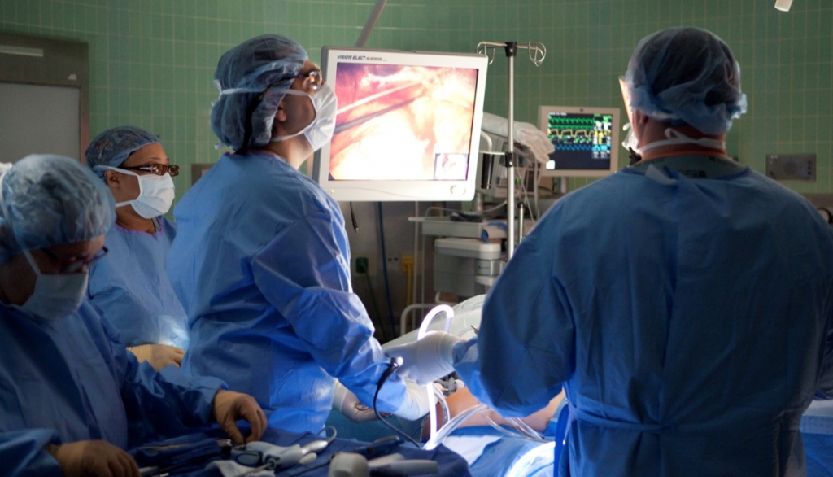
Laparoscopic bariatric surgery is a minimally invasive weight loss procedure that helps people struggling with obesity achieve significant and long-term weight loss. It is an effective solution for those who have tried diet and exercise without success. However, before undergoing this surgery, it is essential to understand the procedure, its benefits, potential risks, and the necessary lifestyle changes. Here’s what you need to know before making your decision.
Understanding Laparoscopic Bariatric Surgery
Laparoscopic bariatric surgery is performed using small incisions and a laparoscope (a tiny camera) to guide the procedure. This method is less invasive than traditional open surgery, leading to faster recovery, less pain, and fewer complications.
Types of Laparoscopic Bariatric Surgery
- Gastric Bypass (Roux-en-Y): Reduces stomach size and reroutes digestion to limit calorie absorption.
- Gastric Sleeve (Sleeve Gastrectomy): Removes a large part of the stomach, leaving a smaller, sleeve-like structure.
- Gastric Banding (Lap-Band): A band is placed around the stomach to restrict food intake.
- Biliopancreatic Diversion with Duodenal Switch (BPD/DS): A complex procedure that reduces stomach size and alters digestion for significant weight loss.
Who is Eligible for Bariatric Surgery?
Doctors typically recommend this surgery for:
✅ Individuals with a BMI of 40 or more (severe obesity).
✅ Individuals with BMI 35+ and obesity-related health issues like diabetes or high blood pressure.
✅ Patients who have tried other weight loss methods without success.
✅ People committed to making lifelong dietary and lifestyle changes.
If you are unsure whether you qualify, consult a bariatric surgeon to evaluate your condition.
Preparing for Surgery
Medical Tests and Evaluations
Before surgery, doctors will perform various tests to assess your health:
- Blood tests
- Heart and lung function tests
- Ultrasound of the abdomen
- Endoscopy to check for stomach conditions
Pre-Surgery Diet
A specific diet is recommended to reduce the liver’s size and minimize risks. This includes:
✔ High-protein, low-carb foods
✔ Cutting out processed sugars and unhealthy fats
✔ Staying hydrated with plenty of water
Lifestyle Adjustments
- Quit smoking and alcohol as they can interfere with healing.
- Increase physical activity to prepare for post-surgery recovery.
- Work on portion control and mindful eating habits.
What Happens on Surgery Day?
- You will be admitted to the hospital and given anesthesia.
- The procedure usually takes 1-2 hours.
- You may need to stay in the hospital for 1-3 days, depending on your recovery.
Potential Risks and Complications
Like any surgery, bariatric surgery has some risks, including:
⚠ Infection or bleeding
⚠ Blood clots
⚠ Nutrient deficiencies (due to reduced food absorption)
⚠ Dumping syndrome (dizziness and nausea after eating sugary foods)
Following medical advice, dietary guidelines, and post-surgery checkups can help reduce these risks.
Post-Surgery Recovery and Lifestyle Changes
✔ Dietary Progression: Start with liquid foods, move to soft foods, and gradually reintroduce solid foods.
✔ Nutritional Supplements: You may need vitamin and mineral supplements to prevent deficiencies.
✔ Exercise: Light activities like walking can speed up recovery and aid in weight loss.
✔ Avoid Unhealthy Habits: Processed foods, alcohol, and smoking can lead to complications.
Expected Weight Loss Results
- Gastric Bypass & Sleeve Gastrectomy patients lose 50-70% of excess weight within the first year.
- Lap-Band patients lose 40-50% of excess weight over a few years.
Bariatric surgery is not a quick fix but a tool for lifelong weight management. Success depends on commitment to healthy eating, exercise, and medical follow-ups.
Final Thoughts
Laparoscopic bariatric surgery is a safe and effective way to achieve significant weight loss and improve health. However, it requires dedication and a long-term commitment. If you are considering this surgery, consult Dr. Lalatendu Mahapatra, a leading Bariatric Surgeon in Bhubaneswar, for expert advice and guidance.
Would you like to book a consultation? Contact us today!

